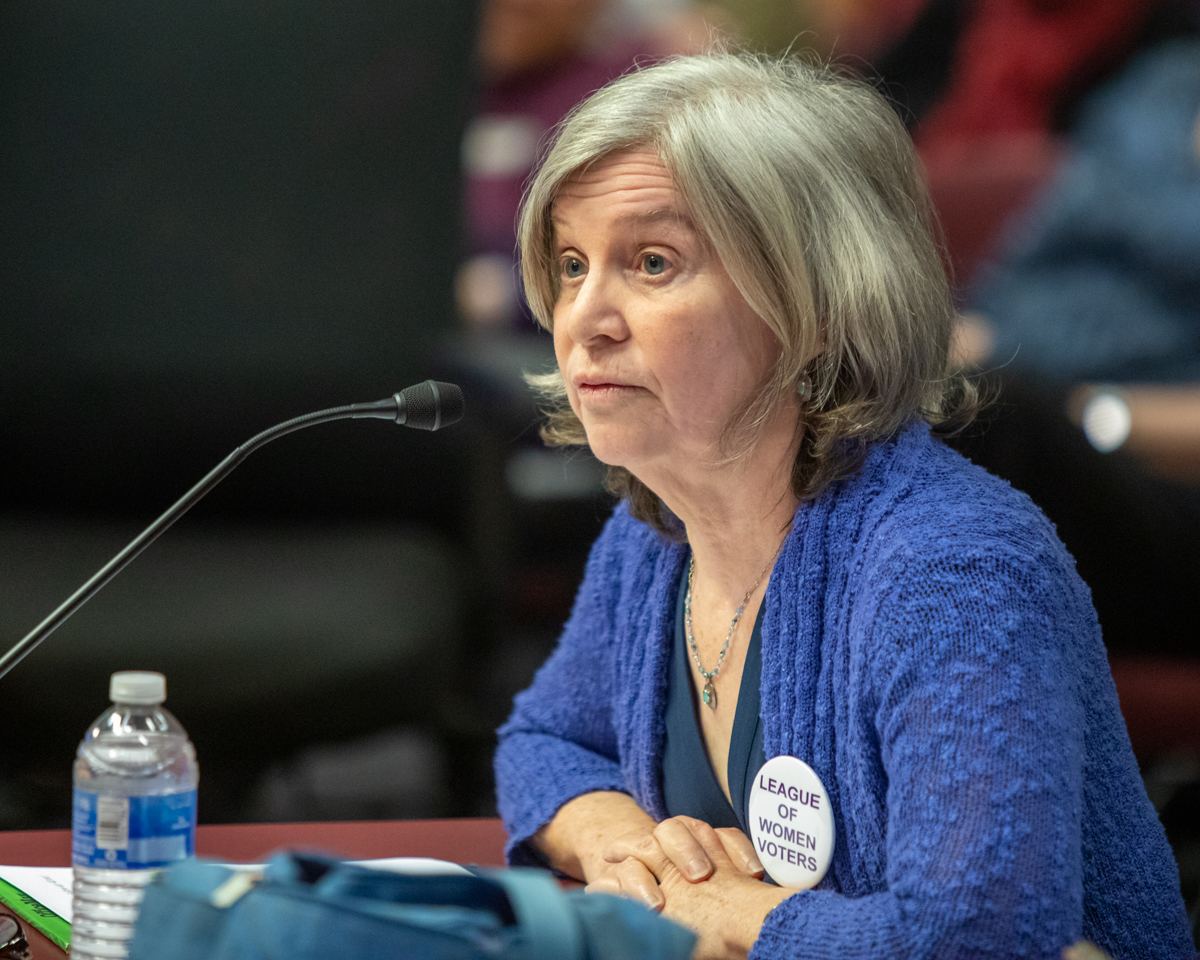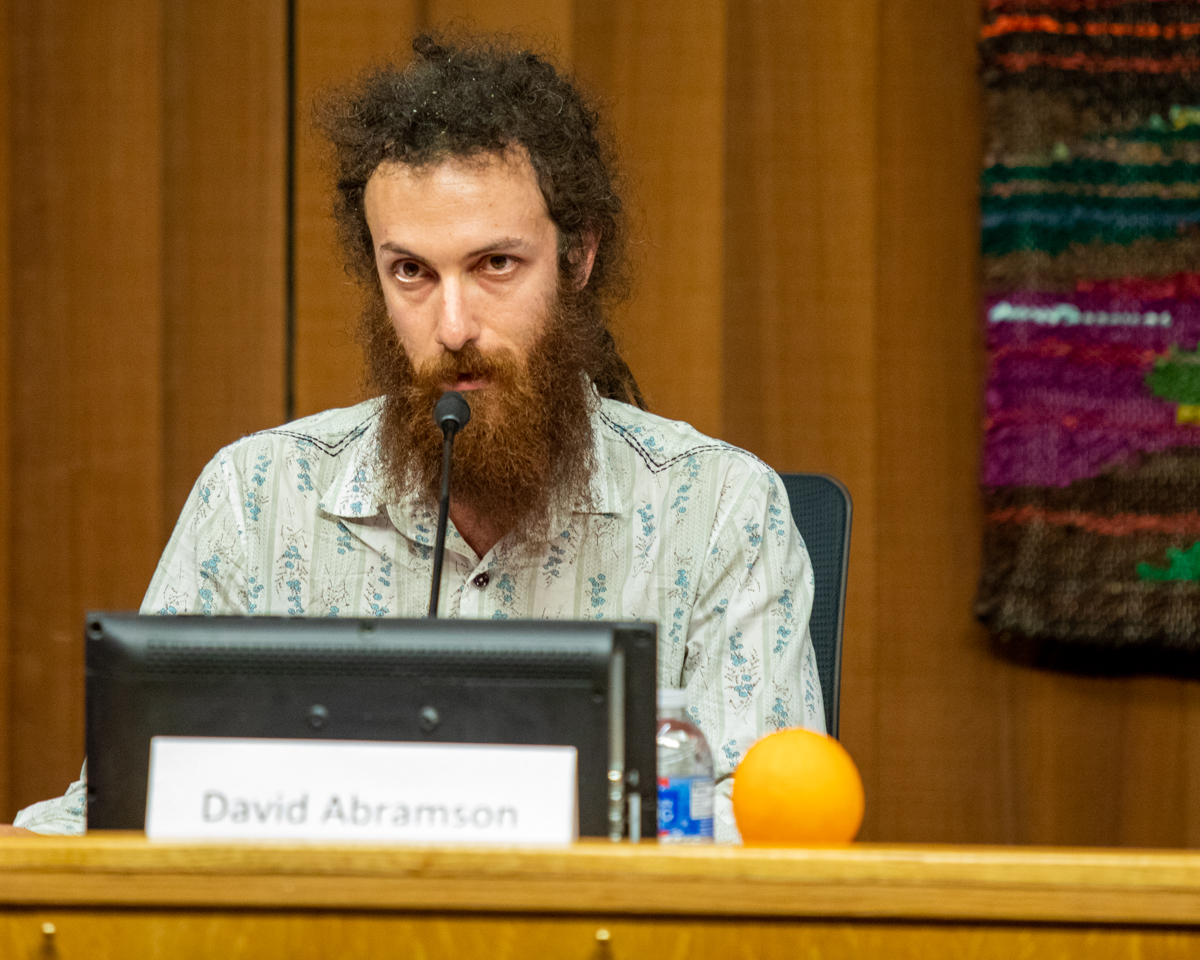

Jim Provenza, a three-term supervisor, is facing two challengers this time – Linda Deos and David Abramson. But on most issues, it was hard to tell the three apart on Sunday as they met at Communities Chambers for the League of Women Voters Forum.
The question that drew the most differentiation was an audience question, where Linda Deos asserted the need for a woman on the board and Jim Provenza responded, arguing that being a parent was an important trait as well.
The main portion of the forum featured seven questions and we have broken the answers up into three parts. This is the first of three. The forum was moderated by Michelle Famula, retired head of student health services at UC Davis.

Question 1: If elected what would your major policy goals be with respect to addressing climate change?

Jim Provenza: The county is already doing a lot on climate change. We were one of the first counties to have a climate action plan, we also established Valley Clean Energy, that provides an alternative source of energy that uses much less carbon than you get from PG&E. I’m also supporting taking over PG&E’s infrastructure if we’re able to do that so that we can so that we can have a successful effort at reducing carbon (footprint).
that we can have a successful effort at reducing carbon (footprint).
The climate crisis – we need to do more. I suggest that we set a goal of 100 percent renewable energy and a commitment to net zero carbon by 2040. David Abramson has talked about this and I agree. This is something that, you set it as a goal, then you go about to get everyone together and you do it. Yolo County can’t do it on its own. But what we can do is get together with the cities and other government organizations in the county, form a joint power authority and figure out how we’re going to get there.
President Kennedy, when he announced that we were going to put a person on the moon by the end of the decade, pointed out that we’re going to do it – that’s our goal. He had no idea how we were going to do it and, guess what, the engineers didn’t either. They heard it, and they panicked, but they did it. That’s what we need to do.
We will set an example in Yolo County, other governments will do it and it will be change from the bottom up. This is a crisis that could cause mass starvation, could cause death of billions in the world and we’ve got to be part of the solution.

David Abramson: I was pleased to see that there were so many questions about the climate crisis. I’ve watched so many of the presidential debates and usually there’s either one or zero – and this is on the national stage. Seeing all of that going on, on the national level, really inspired me to come up with a local plan for how we could address at least our little piece of the puzzle and become more resilient for the changes that are already happening – making sure that we have secure food and water systems.
Basically, according to the panel of climate scientists, we have until 2050 worldwide to become completely fossil free and carbon negative. Which means if every place lags, then we need to move forward in the next ten years.
What we’re proposing is a decade of climate action and community resilience planning through all these different areas that you can see in our platform. The biggest problem that we face is our economic system, which is fundamentally built on extraction and on inequality. We need to re-think our economic system to become more localized and in line with our planetary values.
There’s a lot of information on this online – we put forward a very detailed platform. I encourage you all to check that out.

Linda Deos: I do agree that we need to set some goals and we need to work towards actually actualizing those goals. I think all three of us agree on the year it needs to be done – and be carbon neutral. Carbon negative, I think, makes a lot of sense.
But what I also know is what Yolo County does is fabulous. We can be a leader and we can use what’s happening at UC Davis. We can partner with them, because they have the research ability to make this happen – not just here in Yolo County, but world-wide. We can be the teachers for everybody to take our knowledge out from the county .
I’d love to think that we can be carbon neutral or carbon negative but we are one small spot on the earth. What we can do is spread that out for others. I want to be able to secure funding for our farmers to be able to transition to do new farming practices. Our use of cover crops. What are we doing for re-generation of our soil. We’ve got the Rominger brothers who are doing quite a lot in Yolo County already and winning awards for it. How we can spread that knowledge out to our other farmers and show them you can still make a living and be better stewards for our earth going forward.
We are a leader in sustainability and I commend all the actions that the county has done with regards to this, but … Let us become a rural innovation hub where we can again come up with the answers for the world to build upon.
Question 2: The voters would really like to hear from you on Senior Citizens Services – what can the county do to help seniors who are isolated and lonely integrate better into the community?

David Abramson: I think this is a really important issue to address. I think it gets to something that we should look at in society which is – it’s a lot better in Davis than other places – we’re really separate, we have a culture of separation where we each live in our individual little units. I think the loneliness issues and the sense of longing for a community is something that affects everybody – especially seniors.
My grandma, fortunately, she lived out the last few years of her life right here in Davis, close to our family. That was really nice and she had a supportive community there but I know a lot of seniors, they don’t have that opportunity. We need to facilitate intergenerational gatherings and learning together in open spaces where we can have the youth, where we can have young families, all generations at the same place.
Another issue that’s really important is making sure that there’s adequate public transportation from areas where seniors are – so they can get downtown, so they can have the last mile transit, and really we need to survey the seniors and ask them directly what are the issues that you face? What are the barriers that you face to be able to go out – we need design solutions for seniors that are by seniors and we need to listen as the government.

Linda Deos: Again, going door to door and talking to people, the majority of the people I’ve spoken to here have been seniors. They’re the folks home. They’re the folks answering the doors. And they want to talk. Do they want to talk because they’re lonely? Perhaps, and they have a lot to share.
What’s concerning to me is that we don’t have places for seniors – well we’ve got the senior center here – but I agree with what David was saying about having more intergenerational activities and such going on. I have lived a year in Turkey and that took me back in how everybody comes together at celebrations and I just never saw that here growing up – as you mentioned, we are all separate.
Have you guys heard of the concept called share-kitchens? That would be something I think would be fascinating to explore here in the county. We have this idea of domestic kitchens and culinary spaces and fostering community by bringing in young folks to use those kitchens, working with seniors to kind of work together in going forward with that.
Another idea is being used in Boston and that is friendship works – which connects seniors to young people – opening up people’s homes…

Jim Provenza: I’ve been chair of the Yolo Aging Commission for about 11 years. I also started the Yolo Healthy Aging Alliance to lobby for seniors and to provide education and community support. We’ve been doing a lot. Right now we’ve been working on getting a new adult day health care center – that’s an essential service for keeping seniors in their home as the senior who is taking care of the other person needs respite. The senior who has Alzheimer’s, or some other serious condition, needs help with their medical care. And companionship – and they get that at the adult day health care center.
But it’s over-crowded. There’s a waiting list. We have raised about half the money from private and public sources in order to accomplish that.
I’m also working on disaster planning – our aging commission spent the past looking at problems with evacuating seniors and disabled people during disasters. We just find that there’s no consistent way of keeping track of people who need special help evacuating – that’s one of our recommendations. We’re also taking a look at care homes that have plans for evacuations, so making sure that we enforce standards for those homes that don’t actually practice their plans – or keep the key to their bus in some place where they can find it. That’s one reason seniors were abandoned in some of the other disasters.
We are also looking at improving transportation for seniors – one of things we’re looking at is an Uber-type service but you wouldn’t have to use an app. It would be on the phone and there’s money that would come to Yolo County that we’re looking at spending on that.
It’s been such a pleasure to help seniors throughout my career from the senior center to the healthy aging alliance, and I would like to continue that work.
Question 3: Unfunded county liabilities are estimated to be $885 million – in light of these unfunded liabilities, what is your overall assessment of county finances? If elected, what policy goals would you pursue with respect to county finances?

Linda Deos: It is an issue. It’s an issue here in the city of Davis. And it’s obviously an issue with regard to the county. A lot of it is having to do with our pension costs, health care costs, of our workers.
I want to make sure people have pensions. I want to make sure people have health care. I think that’s fundamental. And something I wish we could expand beyond into the private sector more. Instead of taking those things away, I think they should be giving back more and more to our workers in general.
We need to recognize that those pensions for the county are funded by us – the taxpayers. A couple of things have already happened at the county by moving money, around $800 grand into a pension trust, so that we can then supplement those liabilities going forward.
I would like to look at what our programs are at the county. And do we apply evidence-based type of practices when we’re looking at which programs going forward. Or do we just go with our favorite pet projects. I want to take a look at those special funds, including our enterprise funds, to see how well they’re being used and what their current balances are and any restrictions on those and plan the current uses of those balances.
I want to audit the money coming from the county going to providers and consultants. Something like that’s not even mentioned in our budget. Frankly we’re going to have to negotiate with our unions and talk with them about what more can we do together between the county and our workers.

Jim Provenza: The reason there is a pension liability is that you have to go back to the fiscal crisis of 2008, the Wall Street stock market crash. These pension funds lost tremendous amounts of money. Since then we have been playing catch up – trying to catch up with the amounts of money lost. In addition, PERS has become more conservative – and they probably need to be more conservative – in terms of the amount of money set aside. Everybody has this increased pension liability.
What’s Yolo County doing? We have set up a reserve fund as Linda said. We’re also paying early – making early payments so we pay less interest. We set aside a special fund for the employee health liability. We set aside reserve funds and rainy day funds.
Our credit rating as a county went from a B-minus to an A-minus with a favorable outlook. The reason for that is we’re doing what we should do. This is like paying off a mortgage, you can’t pay it off all at once. If you tried to, you’d go bankrupt. What you have to do is make regular payments on it and, if you’re really good about your money, you make early payments, you make double payments. That’s what we’re trying to do.
It’s like paying a mortgage and it’s going to be paid off over time. Our county is healthy, we audit all of our practice, and by the way, we actually as a board asked that all of our programs be reviewed for evidence-based practices. We’re scrutinizing everything that’s done as a board.

David Abramson: I think when you look at unfunded liabilities, you’re looking at a local reflection of a global economic system that is run in debt. Does anyone know how much debt the US is in? $23 trillion. This isn’t like a local problem that Yolo County’s dealing with. We’re dealing with a fundamental nature of our economic system which to me is an extractive version of capitalism where the money leaves and it never comes back.
To me it’s not the pensions that are the problem, we need to look at the root issues of our economic system and re-envision what a strong local economy looks like. Right now we’re in an economic system where profits are privatized. All the liabilities are being socialized – paid for by us.
I think what we need to do is reinvest in our communities locally and if you go on our website you can see what we’re envisioning for circular economies.
We can deal with quick fixes and shuffling or we can get to the real issue, which is something that hasn’t really been addressed. It’s not saying I have all the answers – it’s saying that we can figure this out together. There are tools out there that will allow us to shift from this endless growth cycle economy towards something that is resilient, takes care of everybody, is equitable and in line with our ecological principles.
—David M. Greenwald reporting


Hi David, I would have to politely disagree with your title about the supervisor forum. The contrast is that Abramson and Deos spoke about what they aspire to, but Jim made it clear time and time again that he is already doing the hard work to address the issues facing seniors and children, managing the budget, and addressing climate change in Yolo County.
David Abramson: “What we’re proposing is a decade of climate action and community resilience planning through all these different areas that you can see in our platform. The biggest problem that we face is our economic system, which is fundamentally built on extraction and on inequality. We need to re-think our economic system to become more localized and in line with our planetary values.”
End extractive gravel mining on Cache Creek? Seriously dude, while I appreciate your values and desire for the reduction in the oxidation of carbon, you think the role of a County Supervisor is to rethink and redesign our economic system. How does that play in El Macero, Wildhorse, Willowbank, Alhambra Estates or with the Farm Bureau? No wonder the Farm Bureau broke with tradition and endorsed Provenza.
Is this how anyone casts a vote? Really?
Ranks right up there with the importance of increasing the number of bearded candidates.